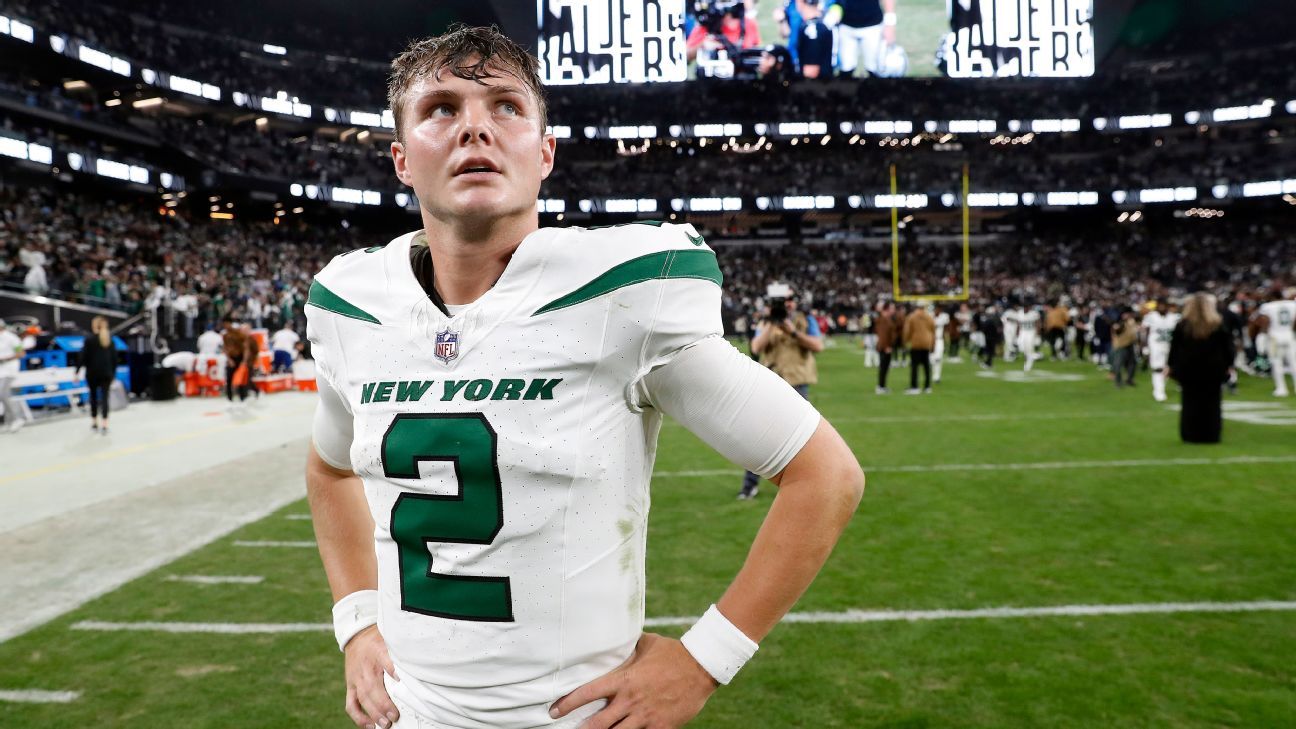FLORHAM PARK, N.J. — Zach Wilson welcomed the challenge. During the run-up to the 2021 draft, he knew all about the New York Jets‘ suspect reputation with young quarterbacks. People in his own camp expressed serious reservations about him going to New York, sources with direct knowledge said, but Wilson told them he’d be able to overcome the franchise’s star-crossed history.
He was wrong about the Jets, and the Jets were wrong about him.
As expected, Wilson — the No. 2 pick that year — was traded after three disappointing seasons, landing with the Denver Broncos on Monday for a swap of sixth- and seventh-round picks. Now that he’s officially gone, ending a most regrettable chapter for the franchise, questions about the future arise: How can the Jets find a successor to 40-year-old Aaron Rodgers? Did they learn anything from the Wilson debacle that can be used to help the next young quarterback?
Assuming Rodgers returns healthy from his Achilles tear that prematurely ended his Jets debut four snaps into the season, they have to feel good about their current depth chart, which includes 34-year-old backup Tyrod Taylor. But the pipeline is dry, and that’s not a good situation for an NFL franchise.
For the first time since 2017, the Jets don’t have a young hope at the position. That year, they had stopgap starter Josh McCown and 2016 fourth-round pick Bryce Petty, who never was seriously considered a “quarterback of the future.” The following year, they invested a first-round pick in Sam Darnold, starting the six-year run of Darnold/Wilson. Both began with bright lights and big dreams; both wound up as cautionary tales.
Rodgers said recently that he wants to play “two or three or four more years,” which could allow the Jets to find and develop an heir apparent — the ideal outcome. But his contract isn’t guaranteed beyond 2024, and they could be looking at an organizational reset if the season doesn’t go well.
General manager Joe Douglas, the man who selected Wilson, sounded like he wants to take a quarterback in this week’s draft (8 p.m. ET on Thursday shown on ESPN, ABC, ESPN App), presumably on Day 2 or 3. Tulane’s Michael Pratt and Florida State’s Jordan Travis took pre-draft visits to the Jets.
“I’d love to be a quarterback factory” like the Green Bay Packers of the 1990s, Douglas said last week, mentioning how the Packers drafted late-rounders, developed them and traded them for fresh draft capital.
One difference, though: The Packers were set at quarterback with Brett Favre and, later, Rodgers, so their late-round fliers were low-risk investments. The Jets might need one of their picks to be their starter someday because the chances of finding a quality first-string quarterback in free agency are remote. If it falls apart with Rodgers, they will go into next year’s draft like the current Broncos and Minnesota Vikings — desperate.
The Jets thought they had a succession plan in place, with Wilson set to learn at Rodgers’ side for a couple of years. It didn’t seem realistic, considering Wilson’s contract is up in 2025, but that’s what they were selling. The plan became moot anyway as Wilson was exposed (again) upon being pressed into action after Rodgers’ injury in Week 1.
It’s hard to come up with many positives on Wilson. Since entering the league, he has ranked 29th out of 29 quarterbacks in EPA/play (minimum: 1,000 dropbacks). Since 2000, he’s 121st out of 122 quarterbacks in the same category, fractionally ahead of Blaine Gabbert.
Perhaps the most damning indictment of Wilson is that the Jets’ offense performed better with other quarterbacks, averaging more points per game when he was on the bench.
The Jets learned some hard lessons along the way. For instance: Patience is paramount. So is a competitive environment. If they draft a quarterback, whether it’s the first round or the seventh, that player will have the benefit of learning from the sideline. Owner Woody Johnson said recently that he feels “badly” that Wilson wasn’t afforded that luxury.
Wilson was handed the starting job with no competition. In fact, there was no veteran on the roster for the early part of his rookie season. Wilson, who faced a weak schedule in his only full season as the BYU starter, was overwhelmed from the outset. Finally, after nearly two seasons, Jets officials admitted they goofed by not having him sit behind a veteran. They tried it in Year 3, putting him behind Rodgers, but it was too late.
The pressure to start a highly drafted quarterback is immense, so it requires a long view and a lot of patience. The Jets, who did the same thing with Darnold in 2018, didn’t exhibit much of either.
A seasoned coaching staff would help, too. Robert Saleh was a first-year coach when Wilson was drafted, and he hired a first-time offensive coordinator in Mike LaFleur. This kind of arrangement doesn’t automatically spell doom — see the Houston Texans‘ DeMeco Ryans and C.J. Stroud — but it wasn’t the right recipe for the Jets.
The plan was to have veteran coach Greg Knapp as their in-house quarterback guru, but he died in an accident before the start of training camp in 2021. Sensing a void, the Jets took the unusual step of adding Wilson’s personal coach, former NFL quarterback John Beck, to the staff in the middle of the season. All that did was create the perception that he was coddled by the organization.
Now, with back-to-back misses at quarterback in the first round, the Jets are left without a long-term answer and a lesson learned.
